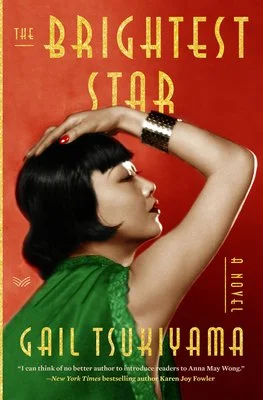The Brightest Star by Gail Tsukiyama
Review of The Brightest Star by Gail Tsukiyama
The Brightest Star by Gail Tsukiyama (2023). Published by HarperVia.
Before I received a copy of this book, I will admit I was not familiar at all with Gail Tsukiyama’s work.
Upon Googling her after finishing the book, I see she’s written a couple of others works that I think I would like to read in the future, but before I get to that point, I’m grateful to have received this ARC from NetGalley via the publisher, HarperVia.
If there’s something to know about me, it’s that I’ve been fascinated with Anna May Wong before it became mainstream trendy to look at her historically and her significance. When Sally Wen Mao began publishing her poems about Anna May Wong, I ate that content up.
I absolutely adore Sally Wen Mao’s work on her—if you haven’t read her AMW poems, do that after reading this.
Anyways, I wanted to read this specifically because of how it’s a fiction book told from Anna May Wong’s perspectives. I was skeptical and curious at how the author chose to tell this story in direct POV of such a star, but went in with an open mind. But, at the end of the day, I think I would have preferred to read a biography than a book like this.
Onwards with the review!
A fictional take on the rise and fall of Anna May Wong.
We get this book divided up by time period—we see Anna May Wong as she has her beginnings in California’s movie scene, but then there’s also cuts to her in 1960 on a journey.
Those who are acutely aware of Anna May Wong’s timeline will known that this is actually the very end of her life, as she died in February 1961. She didn’t make it to sixty, which is pretty sad. But when we start this novel, she’s a youth living in California in her immigrant family’s home, and instead of going to Chinese classes like her father wishes, Anna May runs away to the movie theaters to see what the latest moving picture is.
That inspires her to become an extra on the movie sets, and she eventually works her way up to become one of the biggest silent film stars despite being locked into the racist archetypes of the era.
Anna May was never able to have a leading role because she was Asian, and when the Hays Code starts to get whispered about, that’s the end of her prospects of ever having a leading role in Hollywood. But in the early sections of this book, the only conflict she has is her father. He believes she is bringing shame onto the family name by appearing in these movies, and when she starts to get bad press in China, he believes it even more.
Eventually Anna May flees to Paris where she feels freer than the United States, and even meets people like Josephine Baker in the process. I don’t see the point of recalling the plot past this point, as it follows the arc of Anna May Wong’s life down like a straight line.
As I mentioned before, the most interesting parts about this book is how Tsukiyama has inserted an active consciousness into the scenes of her life, but the book feels like it begins to do too much as it progresses through the extent of what her career and life looked like.
What I mean by this is that the book begins to feel like it’s checking things off of a list, except inserting Anna May Wong into key moments in her own life and inserting “in the moment” thoughts from her.
I think she’s an important figure to keep learning about, but what I stumbled into when reading this book was the thought I have when I tend to read historical fiction books like this. Where are we inserting our own thoughts and ideologies into someone who once existed? When they approve of this kind of depiction?
Overall Thoughts
So for this book, I began to feel like I would personally have more value if I read an in-depth biography about Anna May Wong or the famous people she interacted with.
I began to feel disconnected from Anna as a character because of this, and it becomes harder to remember that she was actually someone who existed. There’s an inherent danger when doing this in television shows and fiction, as it can serve as rewriting at time.
I think Tsukiyama did this with care and thought, but I don’t think it worked for me personally. I’m sure others may enjoy it, but it simply wasn’t something I enjoyed. I honestly started to struggle getting through it because I knew all the facts and events, and the narrative elements wasn’t doing it for me.
Follow me below on Instagram and Goodreads for more content.


![Jeju-do (제주도) is one of those places that reminds you of how stunning the world is
[7.12.2024 부터 7.14.2024 까지]](https://images.squarespace-cdn.com/content/v1/5ea1f794501b7153b29e7cd7/1721033601522-554E76HR01JUHDWZBJ1I/image-asset.jpeg)







